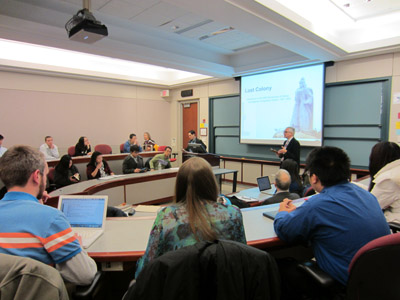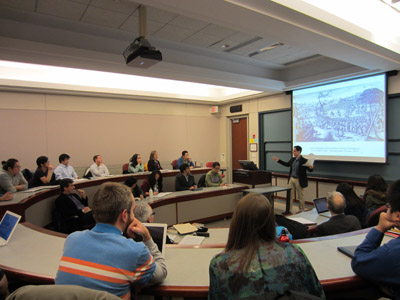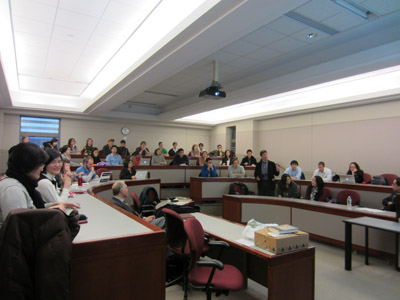Lost Colony: The Untold Story of China’s First Great Victory over the West
By Kevin Liang, CAS History Major
 On November 8th, 2012, the Boston University Center for the Study of Asia (BUCSA) hosted a successful program, part of the BU Taiwan Forum sponsored by the Taiwan Economic and Cultural Office in Boston. Professors Tonio Andrade from Emory University, Xing Hang from Brandeis University, and Michael Szonyi from Harvard University discussed one of the most intensely studied characters in Asian history, Koxinga, and the story of how the Dutch lost their colony Taiwan to him. Eugenio Menegon, Director of BUCSA, introduced the speakers.
On November 8th, 2012, the Boston University Center for the Study of Asia (BUCSA) hosted a successful program, part of the BU Taiwan Forum sponsored by the Taiwan Economic and Cultural Office in Boston. Professors Tonio Andrade from Emory University, Xing Hang from Brandeis University, and Michael Szonyi from Harvard University discussed one of the most intensely studied characters in Asian history, Koxinga, and the story of how the Dutch lost their colony Taiwan to him. Eugenio Menegon, Director of BUCSA, introduced the speakers.
Tonio Andrade gave an overview of his recently published book, Lost Colony: the Untold Story of China’s First Great Victory over the West, to a joint audience of Brandeis and Boston University students, TECO representatives Cynthia Huang and Angela Yao, and BUCSA Visiting Researcher Grant Rhode. Andrade’s objective analysis of Koxinga portrays him as a stubborn ruler, but still loyal to the cause of the defeated Ming dynasty. Although Koxinga frequently disobeyed and ignored his advisors and generals, he is still considered by both Chinese and Western scholars to have been an exceptional leader. His confidence helped him defeat enemies, but overconfidence strained his navy. His naval force suffered substantial losses even though it fared well against the Dutch ships fought during the encounter. After failing to defeat the Qing forces in Nanjing on two expeditions in 1658 and 1659, Koxinga sailed to Taiwan in 1661 to battle the Dutch in their fortress Zeelandia. It turned into a fierce nine-month siege. Koxinga never fulfilled his initial objective of defeating the Ming, but he did succeed in defeating the Dutch and driving them off Taiwan and back to Batavia. Koxinga was not only loyal to the Ming state, but also looked to past heroes and intellectuals like Sunzi through his writing in The Art of War and also to China’s most revered strategist Zhuge Liang to guide his military ideology.
 After Professor Andrade’s presentation, Professor Hang proceeded to discuss current issues accurately portraying China’s global status during the 17th century. He made the point that Koxinga has been interpreted and portrayed in different ways by the leadership in China over the past forty years. He said, for instance, that earlier on he was portrayed as someone who rebelled against the central government, not a popular view in Beijing. Then interpretations of his role in history became more positive. By the 1970s he was viewed as an anti-imperialist crusader, and during the 1990s he was seen as a great unifier desiring to bring Taiwan into the fold. Most recently he is seen as a figure who accomplished the goal of representing China as a successful naval commander, able to cross seas in China’s interest in spite of opposition.
After Professor Andrade’s presentation, Professor Hang proceeded to discuss current issues accurately portraying China’s global status during the 17th century. He made the point that Koxinga has been interpreted and portrayed in different ways by the leadership in China over the past forty years. He said, for instance, that earlier on he was portrayed as someone who rebelled against the central government, not a popular view in Beijing. Then interpretations of his role in history became more positive. By the 1970s he was viewed as an anti-imperialist crusader, and during the 1990s he was seen as a great unifier desiring to bring Taiwan into the fold. Most recently he is seen as a figure who accomplished the goal of representing China as a successful naval commander, able to cross seas in China’s interest in spite of opposition.
 With the conclusion of both speakers’ presentations the floor was left open for inquiries from students aimed at both the professors and the book. Students from both Professor Menegon’s Maritime Asia class at BU and Professor Hang’s Maritime Asia class at Brandeis were involved in the discussion. The event ended with a reception which included book signings by Professor Andrade and casual academic exchanges between students and professors from both institutions.
With the conclusion of both speakers’ presentations the floor was left open for inquiries from students aimed at both the professors and the book. Students from both Professor Menegon’s Maritime Asia class at BU and Professor Hang’s Maritime Asia class at Brandeis were involved in the discussion. The event ended with a reception which included book signings by Professor Andrade and casual academic exchanges between students and professors from both institutions.